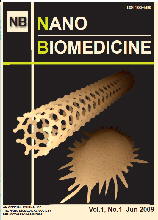
Nano Biomedicine
ORIGINAL ARTICLE
The Combined Effect of an Anti-microtubule Agent TZT-1027 and Radiation on Tumor Angiogenesis
Kazumasa MINAMI1, 2, Yoshinosuke HAMADA1, 3, 4, Naomasa KAWAGUCHI1, Seiji MORI1, Kana NAKATANI2, Kento TSUBOUCHI2, Naoki HAYASHI2, Hirofumi YAMAMOTO1, and Masahiko KOIZUMI2
1Department of Functional Diagnostic Science,
2Department of Medical Physics and Engineering,
3Department of Health Economics and Management,
Osaka University Graduate School of Medicine, Osaka, Japan
4Department of Pediatric Dentistry, Osaka Dental University, Osaka, Japan